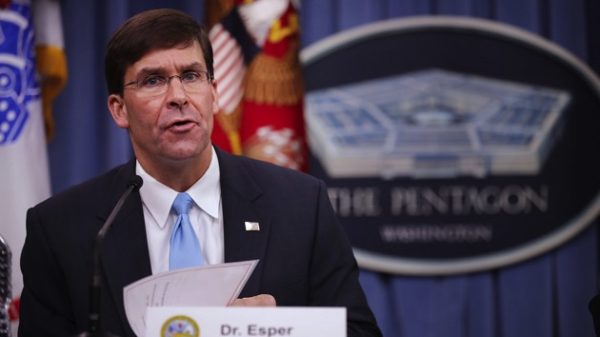
The U.S. may conduct preemptive strikes against Iranian-backed militias, Defense Secretary Mark Esper warned on Thursday, adding that he expects those groups are planning further attacks against U.S. bases in Iraq.
“Do I think they might do something? Yes, and they will likely regret it,” Esper said of Kataib Hezbollah, the militia group that attacked the U.S. embassy in Baghdad this week following U.S. airstrikes on the group in Iraq and Syria. The U.S. conducted the strikes after the group struck a base in Iraq, killing a U.S. contractor.
“There are some indications out there that they may be planning additional attacks,” Esper said. “If we get word of attacks, we will take preemptive action as well to protect American forces, protect American lives. The game has changed.”
With the deployment of Marines from Kuwait to the embassy and an Army battalion from Fort Bragg, N.C., to Kuwait, the Pentagon has enough forces in and around Iraq to fend off further assaults on the embassy or outposts where U.S. troops are training the Iraqi military.
“We are very confident that the integrity of that embassy is strong and it is highly unlikely to be physically overwhelmed,” Joint Chiefs Chairman Gen. Mark Milley said. “Anybody who attempts to overwhelm that will run into a buzz saw.”
The Marines from Kuwait reinforced some 200 contractors and 50 to 100 U.S. troops who were already at the embassy, he explained. The Army battalion — a global response force of 750 soldiers from the 82nd Airborne Division — stands ready to move from Kuwait to reinforce other bases
Kataib Hezbollah had been escalating the frequency and size of its rocket attacks against U.S. bases since at least October, Esper and Milley said, culminating in last week’s strike. “We know that the intent of this last attack was in fact to kill” Americans, Milley said, unlike a string of smaller rocket attacks throughout the year. He did not say how he knew that or whether Iran directly ordered the lethal attack.
Esper warned Iran against allowing or ordering further Kataib Hezbollah attacks, and scolded the Iraqi government for not doing more to curb the militia group, which Iraq considers part of its paramilitary “popular mobilization forces” even though the U.S. has designated it a terrorist group.
“I’ve made the point over and over again that they need to do more internally, within Iraq, to stop these Iran-sponsored militia groups,” Esper said, referring to calls with the prime minister and other Iraqi officials. “They need to get left of the problem and stop these attacks from happening and get the Iranian influence out of the government.”
The U.S. has “clear goals in the region,” he added. “One of them is that Iran become a normal country and behave like a normal country.”
POLITICO

Leave a Reply
You must be logged in to post a comment.